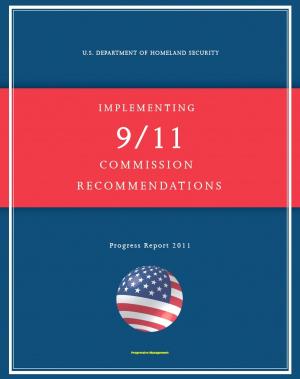The Persistence of Toxic and Unethical Leadership: How Does the U.S. Army Improve Leader Development and Selection? Evaluating Traits Required by Mission Command and Army Doctrine
Nonfiction, History, Military, Strategy, United States| Author: | Progressive Management | ISBN: | 9781370741694 |
| Publisher: | Progressive Management | Publication: | February 26, 2017 |
| Imprint: | Smashwords Edition | Language: | English |
| Author: | Progressive Management |
| ISBN: | 9781370741694 |
| Publisher: | Progressive Management |
| Publication: | February 26, 2017 |
| Imprint: | Smashwords Edition |
| Language: | English |
This excellent report has been professionally converted for accurate flowing-text e-book format reproduction. Statistics show that toxic and unethical leadership is a problem in the US Army and leadership research concludes that this problem has a negative effect on the conduct of mission command. This monograph asks what the US Army can do to better reduce toxic and unethical leadership and develop officers to optimize the force for mission command. To do so the monograph examines the leader development and evaluation systems and, based on findings from those examinations, makes two recommendations to improve the US Army's performance in selecting leaders. The first recommendation is to add additional accountability to the conduct of individual assessments within the Multi-Source Assessment and Feedback program, bringing the individual assessment in line with the Commander 360 assessment. The second recommendation is to use multi-rater feedback concerning the ability to conduct mission command from the Commander 360 as a component of selection for command. The monograph closes with a discussion of potential obstacles to implementation of the recommendations.
Senior officers still exist who do not believe that toxic leadership is an issue that should result in a commander's relief. In July, 2014 the rear detachment commander of Fort Carson suspended a battalion commander after substantial allegations of toxic leadership emerged. He ordered an investigation that commenced nearly immediately. A post-brigade command colonel from a different post conducted the investigation. The investigation was exhaustive, with sixty-six officers, senior non-commissioned officers, and soldiers in key positions interviewed. The investigation revealed additional instances of toxic and negative leadership and substantiated those already alleged. Those substantiated allegations included "constant belittling and humiliation" of subordinates, "incessant profanity used directly towards" subordinates, "throwing items during meetings", to include an instance of hurling a hardcover notebook at a junior officer. The subject commander is quoted as saying, "you want toxic, I'll show you toxic," and in her own statement submitted to the investigating officer she describes her subordinates as "slackers" and blames them for the climate of the organization. The investigating officer's findings describe an environment of "intimidation" where subordinate leaders are in fear of "being reprimanded or fired on a daily basis." He concludes that the subject commander, "has created an adverse, toxic environment with her consistent words and actions and the organization suffers as a result." Due to the severity of the battalion commander's actions and the state of the command climate in the unit, the investigating officer recommended the battalion commander's relief from command.
This excellent report has been professionally converted for accurate flowing-text e-book format reproduction. Statistics show that toxic and unethical leadership is a problem in the US Army and leadership research concludes that this problem has a negative effect on the conduct of mission command. This monograph asks what the US Army can do to better reduce toxic and unethical leadership and develop officers to optimize the force for mission command. To do so the monograph examines the leader development and evaluation systems and, based on findings from those examinations, makes two recommendations to improve the US Army's performance in selecting leaders. The first recommendation is to add additional accountability to the conduct of individual assessments within the Multi-Source Assessment and Feedback program, bringing the individual assessment in line with the Commander 360 assessment. The second recommendation is to use multi-rater feedback concerning the ability to conduct mission command from the Commander 360 as a component of selection for command. The monograph closes with a discussion of potential obstacles to implementation of the recommendations.
Senior officers still exist who do not believe that toxic leadership is an issue that should result in a commander's relief. In July, 2014 the rear detachment commander of Fort Carson suspended a battalion commander after substantial allegations of toxic leadership emerged. He ordered an investigation that commenced nearly immediately. A post-brigade command colonel from a different post conducted the investigation. The investigation was exhaustive, with sixty-six officers, senior non-commissioned officers, and soldiers in key positions interviewed. The investigation revealed additional instances of toxic and negative leadership and substantiated those already alleged. Those substantiated allegations included "constant belittling and humiliation" of subordinates, "incessant profanity used directly towards" subordinates, "throwing items during meetings", to include an instance of hurling a hardcover notebook at a junior officer. The subject commander is quoted as saying, "you want toxic, I'll show you toxic," and in her own statement submitted to the investigating officer she describes her subordinates as "slackers" and blames them for the climate of the organization. The investigating officer's findings describe an environment of "intimidation" where subordinate leaders are in fear of "being reprimanded or fired on a daily basis." He concludes that the subject commander, "has created an adverse, toxic environment with her consistent words and actions and the organization suffers as a result." Due to the severity of the battalion commander's actions and the state of the command climate in the unit, the investigating officer recommended the battalion commander's relief from command.















